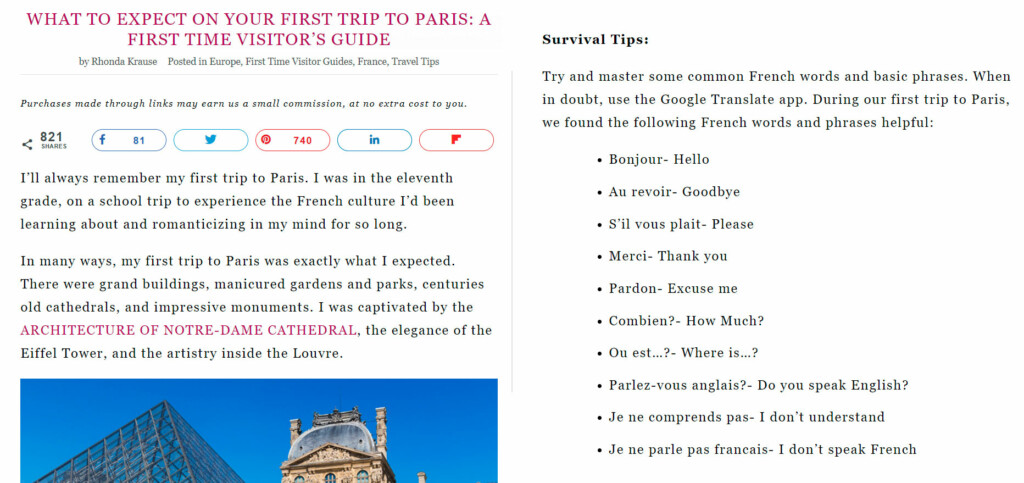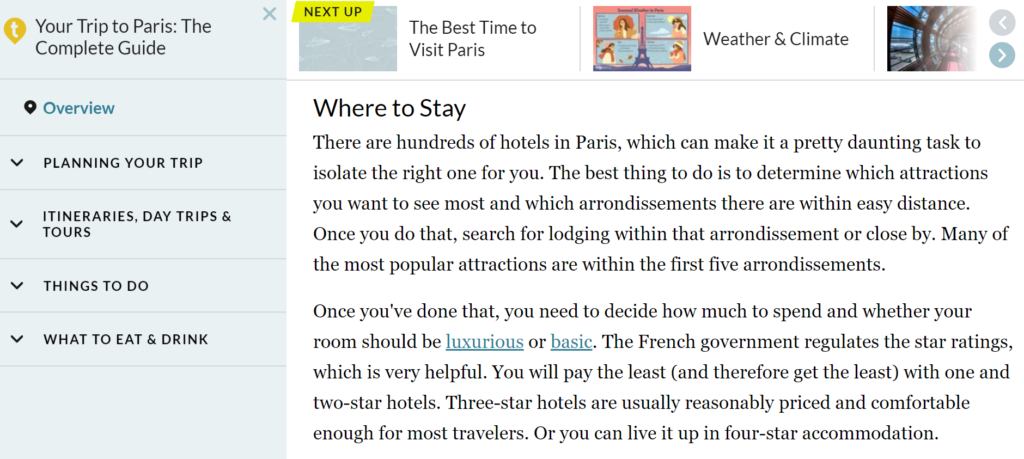How to Find Ideas for Your Blog Content
A blank page is a nightmare for most writers. But you need to know what to talk about to start writing. In this part of the article, we’ve compiled a list of ways how and where you can find inspiration and come up with content ideas for travel blog. Basically, you can either share personal experience and ask others to talk about theirs or use analytics tools to determine what content is in demand and respond to the need. Now, let’s see each way in detail.
Share Personal Experience
If you are a savvy traveler, there is nothing better than sharing your personal experience. Stories like that always draw attention due to their emotional narrative and help build trust with your community.
Also, personal traveling experience might be extremely useful for others as you are supposed to provide real facts. Knowing that someone had trouble with a particular railway company, for example, might help other travelers avoid making the same mistake.
Such materials are especially useful for destinations off the beaten path, as any knowledge is precious. But, what if you want to talk about your travels to one of the world’s most popular places?
Only lazy bloggers haven’t written about Paris, New York or Amsterdam. In this case, consider finding a new angle on the matter. Instead of describing how beautiful the Eiffel Tour is at night for the hundredth time, tell readers about the coziest bakeries in the area where they will be able to enjoy the view and the finest pastries at the same time. Or share the survival tips:

All journeys are different, just find what makes it unique!
Another thing to consider is how to deliver the information. There are many appropriate formats like a travel guide, journal, reports and more. To make a good choice, think of what you want to share the most. Give advice on places to visit by writing a travel guide with all the addresses and must-know facts.

Last but not least, you can tell your story by writing a travel blog post about mistakes you’ve made on the road so your followers will be conscious of them. Whether it was a poor choice of transportation service or simply bad timing, sharing this in the first person is not only helpful, but it is likely to engage your audience even more.
Ask Others to Share Their Experience
The same goes for the personal experience of other people. It will generate interest, motivate readers to share their worries or happy moments, and help you build a community. You can ask someone within your inner circle or reach out to travelers you haven’t met in person, but you’ve seen their comments or pictures on other forums or blogs.
First of all, it’s flattering to be asked to tell your story, and second, it will help make a name for them as well. Finally, it might become a solid base for future cooperation.
You can explore Tripadvisor since many people leave long and detailed comments there, Lonely Planet community, Travellerspoint and more.
Also, consider guest posting. It means finding another influencer within your niche who will be likely to share their experience in exchange for a backlink to their blog. You can approach a blogger of your preference directly or check a list of websites accepting guest posts, like this one.
Use Keyword Research
Proper keyword research allows you to explore which keywords are relevant within your niche and can give you travel and lifestyle blog post ideas.
Finding what combinations get a good number of monthly searches is the first step towards choosing a new topic that would engage your audience. Below, we have listed some of the best keyword explorers available today.
- Ahrefs is a versatile platform combining a keyword explorer and many other SEO tools. It is a good choice if you are thinking about checking your website performance or even auditing it because Ahrefs offers package deals. The price starts at $99, but you can enjoy a seven-day trial for $7.
- Serpstat is a free program allowing you to research keywords. It will show you the level of competition between domains for the given keywords and other statistics, including the top-10 examples of pages with the same keywords in the title. This might give you ideas as to what to write about, as well as a list of competitors in organic search.
Use Blog Post Idea Generators
Apart from keyword explorers, there is another set of tools aimed at helping writers find inspiration for their travel blog ideas and come up with great titles. Blog post idea generators produce dozens of content ideas based on the keywords you want to use in the title. We’ve rounded up some of these tools below.
- Portent’s Content Idea Generator is a simple program. Just type in your subject and receive blog topic suggestions every time you click the “Refresh” button. Although sometimes the platform delivers awkward or funny ideas, it can still be useful if you need to automate the process.
- BuzzSumo analyzes relevant posts and blogs and delivers a list of the most popular topics within your niche. You can use the basic functions for free or try its premium version. Below, there is an example of content analysis for the given keywords. You can filter the results by engagements, links, shares and more.
- Link Bait Generator has a minimalistic design that simplifies the searching process since there are no distracting elements. Basically, you type in your subject, and the platform offers a number of headline suggestions, as you can see in the example below. You can also select different headline categories.
Ask Community
To know what’s in demand, you need to go out there and just ask. One of the most popular means of communication today is social media, and you should take advantage of that.
There are many ways to find inspiration. Scroll through the threads to find the most relevant ones and then see what people talk about, start a new thread to reach out to as many people as possible, or use the internal site research for your keywords.
This method is likely to take some time but it will provide you with delightful and original topic ideas for your travel blog. Let’s see what social networks might be useful for you.
- Quora. This is one of the most popular platforms where people ask questions and give answers. There are many travel-related threads like Travel tips and hacks, Travel illustrated, Travel Nomads & Guides, etc. In each thread, you’ll find hundreds of questions and answers that are either upvoted or downvoted by users according to their relevance. To ask a question of your own, click on the “Add question” in the upper right, and formulate the question. You will see similar questions emerging below as you type yours, and in case there is nothing relevant, you can add the question. Then, you will need to choose a range of topics that are related to your question and, optionally, send requests to suggested writers.
- Reddit. This is another social network to share your ideas and experience. Reddit features strong user engagement, so it might be a good choice for exploring the market. You can browse popular communities or search for relevant threads such as Travel or Solotravel, just to name a few. Also, it is possible to create a new post. Note that as a new user, you’ll find it easier to start a discussion by leaving a comment below some of the most popular posts than by waiting for a post of your own to start attracting users.
- Facebook is the world’s leading social network, as you can see in the graph below. It accounted for over 2B users in 2017 and is constantly reaching a larger audience. You can either explore relevant groups, pages of travel agencies or travel bloggers or look for insights on the Facebook Business page.
- YouTube is the second most popular social media network worldwide, and it is favored by 81% of businesses as you can see in the picture below.
- Find inspiration with one of the most popular travel vloggers like Vagabrothers, Grrrltraveler or The Food Ranger among many others. You can also type your keywords in the search bar and see what YouTube has got for you.
There are many other popular social networks, so social media can help you reach out to as many people as possible.
To communicate efficiently and get feedback, keep an eye on your posts and answer all the comments users leave in relation to your messages to let them know you appreciate their help. Being polite is never a bad thing.
These people might become interested in what you do and join your community. If not, you might need their engagement in the future again, to come up with blog post ideas for other topics. To automate this process, use one of the dedicated services aimed at monitoring the activity on social media, like Keyhole, Hootsuite, Digimind and more.
To provoke a conversation, do one of the following things:
- Write one or a few questions in your posts so people can answer them in comments.
- Use a numbered list and ask readers to add their own ideas. Ask for predictions.
- Create a contest that will motivate people to share their opinion with you.
- Discuss gossip to engage a wider audience and draw attention.
- Finally, just write a controversial post so people can’t resist voicing their opinion.
Make a Poll
Whether you explore social media and dedicated forums or communicate with your blog readers, creating a poll is a great way to get feedback, as it doesn’t require much effort from users and is fun (remember that!).
Ask a question and then provide possible answers or leave a blank space. There are numerous platforms aimed at making polls such as Poll-maker.
After you type in the question and response options, the program will provide a link to your vote or code that you can insert on your blog. You can create free polls on Twitter, Facebook, Instagram and other platforms.
There are also Google Forms that allow you to create surveys for free.
Use Google Autocomplete
There is one more way to find what people are looking for online, and it is Google Autocomplete (previously called Google Suggest). Launched in 2007, the tool was aimed at reducing the typing time, but it also can help you find more content ideas.
Its algorithm offers five to ten search queries matching the term you type in the search box. The suggestions are influenced by the location and language settings as well as previous searches.
Also, Google shows relevant and trending searches so it can help you understand what people are looking for these days.
Examples of Travel Blog Content Ideas
Now let’s see how to find content ideas for your blog in practice. Suppose, you are launching a travel website and looking for blog post ideas.
First of all, think of what your readers might be interested in knowing and create several categories such as “Transportation,” “Cuisine” and more, to facilitate the search process for readers. Now, we will suggest a few headline ideas for each category, assuming your blog will be about traveling around Europe.
Before Traveling
This is actually a very useful category, as traveling starts long before the departure date. You can write about getting a visa, choosing an insurance company, packing a bag and more. Here are some titles that might work for articles on travel insurance:
- 13 Amazing Facts About Travel Insurance
- The Beginner’s Guide to Travel Insurance
- 10 Ways Travel Insurance Can Help You Live to 100
No matter how easy it is now to get a visa, some people still have doubts about whether they might get one. Take advantage of this fact, and help your readers make the first step towards their dream trip:
- The Ultimate Guide to Getting a Visa to France
- Everything You Ever Wanted to Know About Spanish Visa
Transportation
Transportation is crucial in organizing a trip, and it also might be an income source for bloggers who join affiliate marketing. You can find more about how affiliate campaigns work here.
Meanwhile, you can write about transportation companies whose services you’ve used yourself or the cheapest travel options, for example. Here are some titles for you:
- 6 reasons to try Blablacar in Europe
- How to find cheap flight tickets
- 8 reasons car rentals will change the way you think about traveling
- 10 insane (but true) things about car rentals
- 13 best railway companies in Europe
Accommodation
For you as a blogger, writing about accommodations can also help generate money if you join one of the affiliate campaigns.
- How to find a hotel in Paris
- Why you should try Airbnb when in Europe
- 14 secrets about hotels in Amsterdam
- The 12 biggest Couchsurfing blunders
- Affordable accommodation in Sweden by the numbers
Sightseeing
Sightseeing is a very important part of travel, because it is interesting, fun and it helps connect with people. Why don’t you tell readers about your own experience or compile a list of must-visit places in major cities?
- When is the best time to visit the Eiffel Tour
- Museums in Lyon you shouldn’t miss
- TOP 10 places to visit in Barcelona
- How to sightsee in Europe like Donald Trump
- Low budget sightseeing tours in Berlin
Cuisine
Holidays abroad are unimaginable without trying local food and diving into the culture. This section is perfect for describing your culinary experience and helping readers discover the best places.
- Is Swiss cuisine a real thing?
- Where to get the best croissants in Paris
- Top 5 vegetarian restaurants in Brugge
- What you should try in Portugal
- Most famous French beverages
Events
This is a great section to talk about concerts, shows, conferences and whatever events you think will be interesting for your audience.
- Concerts you shouldn’t miss in September in the Netherlands
- Meetups in Poland: Beginner’s guide
- What events will help you meet local people in Germany
- Best flamenco shows in Barcelona
- What you should know about the April Fair in Seville
You can either use these titles or get inspired by them to come up with more blog post ideas for your website.
Best Content Ideas for Your Travel Blog
As you can see, finding content ideas for your travel blog is not as difficult to do as it sounds. You can either share a personal experience or do research and write about topics that are currently trending. Social media is always a good way to reach out to people and find what they are interested in.

